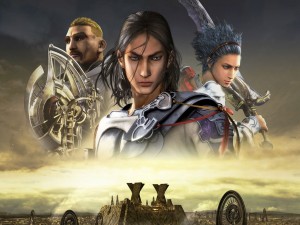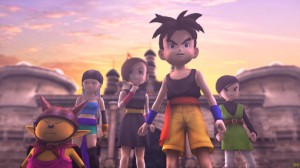Mistwalker Studios Might Just Eclipse Square Enix

Lost Odyssey by Mistwalker Studios
For a long time, I wanted to be a video game programmer. When I was still in elementary school, I saved up the $200 or so dollars for an entry-level version of Microsoft Visual Basic, went to trade shows to buy software on 5″+ floppy disks, and worked on creating my own version of the original Legend of Zelda in Microsoft Basic. At some point, however, my obsession with finance overcame everything and the idea of sitting in a skyscraper, reading stock reports, and compounding money for the sheer joy of building something eclipsed the video game dream. The reason was simple: I realized that if I achieved the empire on the financial side, I could someday just buy or establish a video game company. If I became a low-level “code monkey”, as people in the industry referred to themselves, I couldn’t have the other. It was a case of having my cake and eating it, too. Perhaps I should have known my idea of fun was spending hours playing Duck Tales on the original NES, shuffling Uncle Scrooge around the world to acquire treasure.
Looking back, Squaresoft, and later Square Enix after the merger, released a series of games including Final Fantasy, Chrono Trigger, and Kingdom Hearts that eclipses nearly every other development house in terms of pure quality and fan obsession. The only notable exception would be Nintendo, which owns the original hall-of-fame franchise covering Mario, Luigi, Bowser, Samus Aran of Metroid fame, Link and Zelda from The Legend of Zelda, and Donkey Kong. The problem with Square Enix is that it seems like the last unbelievable game that was released under its banner was Final Fantasy X. That was nearly ten years ago. I was in college. That should put it in perspective.
Instead, Hironobu Sakaguchi, the original creator of the Final Fantasy series launched a new studio called Mistwalker with the backing of Microsoft. He got the composer Nobuo Uematsu, a veritable genius when it comes to scoring iconic video game soundtracks, to compose the music for the studio’s two releases, Lost Odyssey and Blue Dragon. I’ve been playing my way through both games over the past six months and there is no question that the quality of Mistwalker’s work far exceeds that of Square Enix, with the exception of the Kingdom Hearts series. In fact, it feels like Mistwalker is more Square Enix than Square Enix is.

Blue Dragon by Mistwalker is one of the best games that has ever been made.
What scares me is that my family and I used to buy Squaresoft / Square Enix games on the power of the brand name alone. We didn’t even need to know what the game was about or the plot, we simply knew if we bought it, we wouldn’t be disappointed. That isn’t the case any longer. The franchise value of the brand has gone down (I wrote about this concept in Profiting from Franchise Value at my Investing for Beginners site at About.com). Instead of releasing one or two unbelievable games that will change the genre, it seems like they are attempting to pump out as many derivative-based titles as possible. I can’t even count the number of releases that have been hyped under the Final Fantasy name for systems such as the DS or PSP. Wouldn’t it be better to create a handful of classics than a long stream of mediocre non-events?
The great thing about capitalism, though, is that someone, somewhere, will create a work of pure art and the market will reward them for it. I truly hope Square Enix doesn’t fall into mediocrity. But if I were forced to bet on quality, my money would be on Mistwalker Studios right now. I really do wish the firm were publicly traded so I could get a look inside the operations. Otherwise, it’s all guesswork at best.
Update: I released this post from the blog’s private archives on 05/25/2019 as part of a special project. The past decade has been interesting in the video game industry. Mistwalker Studios led the forefront of a movement called Concept Teams in Japanese gaming. It purposely stayed small – under twenty people – and worked with other companies so the founders could focus on the creative side, rather than the business management side, of the enterprise. On March 16, 2018, Polygon wrote a wonderfully informative article providing a behind-the-scenes look at this new business model. You should read it if you are interested in the economics of this sort of thing.


